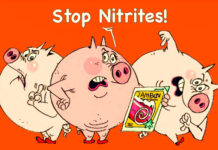The Yuka app is fully entitled to inform consumers about the risks related to nitrites added in cured meats. So decided the Court of Appeal in Aix-en Provence, a university town in southern France, in reforming one of two convictions of the founders of the app that offers valuable instant ratings on food and cosmetics. A victory for Yuka-which uses the NutriScore to examine the nutritional profiles of foods-and for its millions of consumers.
The campaign against nitrites in cured meats
Yuka, Foodwatch and Ligue contre le cancer have been on the front lines against the use of nitrites and nitrates (E249, E250, E251, E252) in food for three years. (1) Their petition launched in 2019 has already collected 372,000 signatures.
Activism against these preservatives has cost Yuka two intimidating court actions from the processed meat industry, which has denounced as an ‘unfair trade practice‘ and defamatory the warning about the health dangers related to the consumption of nitrates, with links to the petition calling for their ban. And a first conviction of Yuka in Paris was followed by a second in Aix-en-Provence, where, however, on 8.12.22 the Court of Appeals reversed the judgment. Affirming, at last, freedom of expression.
Nitrites in cured meats and cancer risk, ANSES assessment
Yuka’s conviction in 2021 had seemed an anachronistic attempt to ban public disclosure of information–based, moreover, on solid scientific bibliography–on an issue central to public health and therefore already considered by the National Assembly in a special bill, as noted.
The breakthrough in the appellate judgment in Aix-en-Provence, among other things, is consistent with the scientific risk assessment published by ANSES. Indeed, the National Food Agency has confirmed ‘the existence of a positive association between exposure to nitrates and/or nitrites through processed meats and the risk of colorectal cancer.’ Paving the way for a new risk analysis by EFSA.
French government at the gate
The next expected verdict is the political one. The French government, in light of the ANSES opinion, has pledged to propose measures by the end of autumn. A reduction in the use of these preservatives can be expected, although civil society is calling for their complete elimination. Nitrite- and nitrate-free cold cuts, after all, are already a reality.
‘Given the health risks, the precautionary principle calls for a ban on these additives, in France and then in Europe,’ thunders Karine Jacquemart, director general of Foodwatch.
‘Beware of false solutions! A simple reduction in the doses of these additives in foods on a voluntary basis by companies, an idea advocated by some, is by no means an acceptable solution for the protection of public health, particularly for the most vulnerable populations. We are talking about thousands of preventable cancers, as long as we are no longer exposed to these additives in cured meats and their consequences’, urges Daniel Nizri, president of the French Cancer League.
A support for charcuterie producers
Pressure is also strong in the political halls. On 11/24/22, Senator Yves Détraigne of Union Centriste (center-right) pressed the government with a question addressed to the Minister of Health and Prevention on whether it intends to ban the addition of nitrites to foods.
The change should also be economically sustainable, according to the politician. That suggests ‘exploring ways to do without these substances without degrading the sanitary and organoleptic quality of cured meats by finding technically and economically acceptable solutions for processors. This requires supporting producers in experimenting with alternative methods to the use of nitrites.’
Notes
(1) potassium nitrite (E249), sodium nitrite (E250), sodium nitrate (E251) and potassium nitrate (E252)
Professional journalist since January 1995, he has worked for newspapers (Il Messaggero, Paese Sera, La Stampa) and periodicals (NumeroUno, Il Salvagente). She is the author of journalistic surveys on food, she has published the book "Reading labels to know what we eat".








